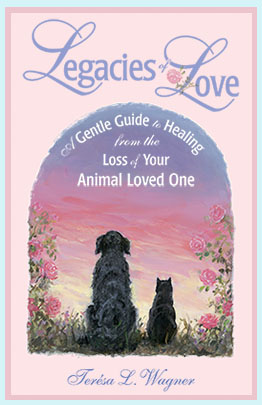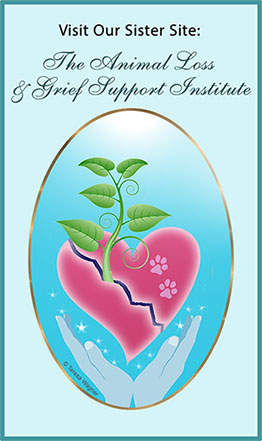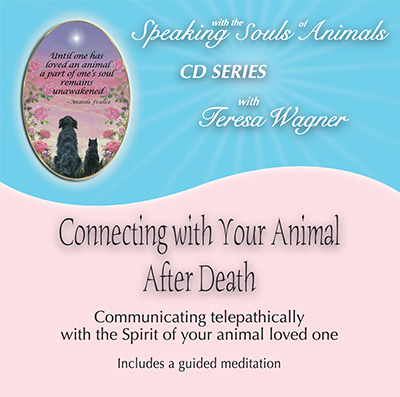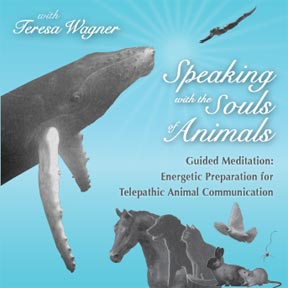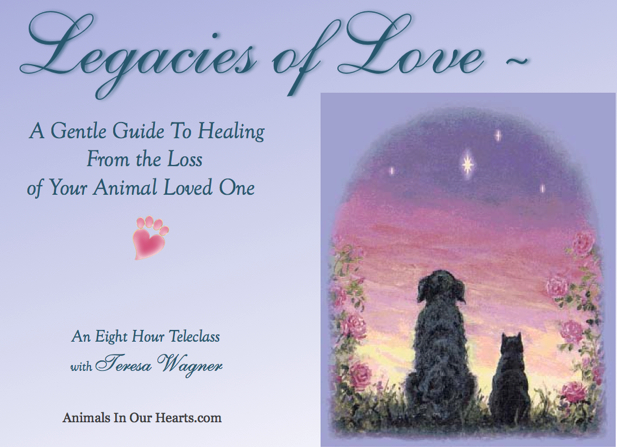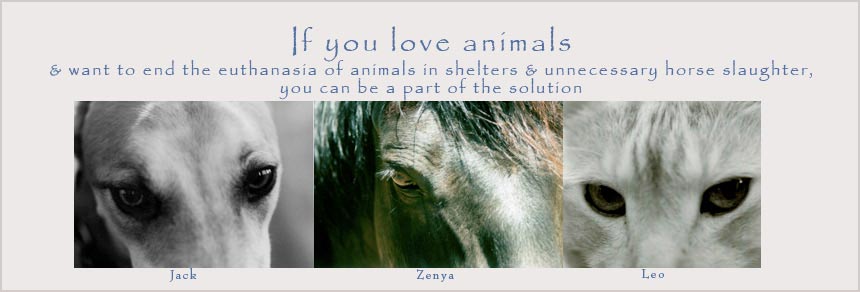Comfort & Healing in Your Time of Grief
Grieving Choices: Deny, Cope or Heal
When we lose a beloved animal our heart feels broken into a thousand pieces. There are three very different ways we can deal with this heartache and pain. I like to think of these as choices about how we respond to loss, though many of us usually respond unconsciously rather than consciously to emotional pain. As you read about these choices, see if you can identify your typical ways of dealing with grief, and if there is anything you may want to change or shift.
One choice is to deny the significance of our loss, to bury our intense emotions ~ repressing them, pretending there is no emotional work to be done. When we're in denial our understandable goal is to not have overwhelming feelings. Denial means that we pretend, even to ourselves, that an emotional crisis is not going on. We might do this because we have no past experience or skill in successfully tolerating and healing strong emotions, or perhaps because in our family or culture it has not been socially acceptable to openly mourn, especially for an animal. So people in denial can appear to be unfeeling, or appear to not be grieving, when actually they may be unaware of their feelings. Denial can take the form of rationalizing or intellectualizing our loss, sometimes taking on the belief of others that "this is not the end of the world, after all, it was just a pet." Without a support system of others who love animals as much as we do, it can be hard to feel that it is safe enough, or acceptable, to express our intense grief. Yet for someone who has loved their animal profoundly, denial simply doesn't work. It might temporarily mean escaping overwhelming pain, but suppressed emotions always return. They may return when we experience our next loss, giving us the challenge of multiple losses to deal with and grieve. Initially denied feelings often return with distortion, sometimes in unexpected, seemingly unrelated, or misplaced ways ~ such as a short temper, diminished ability to commit fully in relationships, burnout, depression, or anxiety. Sometimes emotions will express themselves through physical symptoms. When we don't listen to our emotions, our bodies will often cry out.
If you feel you are in denial, read the Twelve Ideas on Coping and Finding Comfort section to search for some strategies of coping that feel safe and appropriate for you as you are grieving the loss of your pet. Also, see our Pet Loss Support Resources section on flower essences to read about essences that can help us safely open up to our feelings.
A second choice we have to deal with our loss is to cope. Coping means we find ways to continue to function in our everyday lives despite our pain ~ we show up for work, we carry out our normal daily routines, we pull ourselves up by our bootstraps enough to survive, we go on... all the while acknowledging, not denying, that we are going through a very difficult time. When we choose coping as our predominant way of dealing with grief our primary goal is to not break down and fall apart. When we cope we experience much more stress than when we're in denial ~ because we feel our pain ~ and yet at the same time we want desperately to stop it. We're aware of our feelings but want to squelch or suppress them, not accept them. People who cope find ways to escape the overwhelming feelings so they can continue their lives without disruption. Some of these, if taken to an extreme, might have negative consequences such as overeating, drinking, or taking mood altering drugs. Other "coping escapes" can help us find both temporary release from the pain while also adding something positive to our days ~ taking a walk in nature, being with a friend, animal or human, venting our feelings at a support group, going out to dinner with a friend or loved one, watching a movie, working out, or whatever it is that makes us feel relaxed and OK, even if temporarily. Coping skills are important and necessary competencies to weather any crisis. Coping keeps us surviving, but it still feels like a struggle and it's stressful. Thankfully, coping and denial are not our only options.
Our third option in responding to grief is to choose to fully heal. Webster's dictionary describes healing as "restoring to wholeness." If we choose to heal when we lose a beloved animal, it means that our goal is to not merely cope, but to accept what is, to seek peacefulness and serenity about what cannot be changed. When we merely cope we keep on living but pay for it with the stress and tension which is part of resisting what is. When we choose healing, we accept that loss and pain are part of life, that overwhelming feelings are part of life. We learn to surrender to them and trust that we will not only survive, but will have opportunities to grow, learn and even transform from doing so. Authors Stephen Levine and Bernie Siegel in their best selling books about death, dying, and healing talk about how healing from a life threatening illness does not necessarily mean not dying. They describe healing as facing our most important unfinished business and issues in life and coming to peace about them. True healing from the loss of our beloved animals means that we face and complete any unfinished feelings of guilt (so common when we question what more we could have done), or feelings of resentment and anger (directed perhaps at others we felt could have done more for our animal or could have supported us in a better way). Following the path of healing also means we are simply willing to feel all of our feelings ~ not just talk about or intellectualize them, but really experience them, allowing them to live their course and leave. When we cope we are aware of our emotions but try hard to squelch them. When we are only coping we are usually still resisting what is. It is this resistance which causes so much suffering. When we choose the path of healing we are aware of our emotions, learn to accept them, and eventually release them.
Taking the healing stance in response to painful loss assumes that there still will be times when to keep functioning in the world we must keep our emotions in check. Sometimes we may temporarily put our feelings on hold because we are too exhausted for more healing work, or because we simply can't sob and drive or whatever at the same time. This is as it should be. But on the healing path this is done consciously, while on the coping path it is done unconsciously and is not alternated with attempts to really resolve our feelings.
Everyone, every single one of us who loves our companion animals will experience losing them. That we will experience this is a fact. Our reaction to our loss is our grief ~ our emotional response. That we will feel pain is also an inescapable fact. But what is our choice, not an automatic response, is whether or not to pour energy into attempts of reconciling our grief, to work toward true healing. Loss and the accompanying grief is something we all experience, but healing happens only through conscious choice. So what does healing look like?
Healing from grief is not an event, it's a process. It's a choice to move beyond denial or mere coping or symptom management to accept the crisis of loss and to use it to grow. It means we are learning to:
-
Draw sustenance from the meaning and purpose of the relationship with the beloved animal we have lost
-
Accept and face strong, powerful emotions, rather than avoid them
-
Come to terms with any anger or guilt surrounding our loss
-
Open ourselves to serenity and acceptance, along with our anguish and sorrow
-
Find ways to express and eventually let go of painful emotions
-
Cherish the gifts of love and other learning we exchanged with our animals and integrate these into our way of being, into our daily lives. These are the legacies of love which transcend physical death.
For more support, you may want to explore the series of class designed specifically for people who are grieving the loss of beloved animals classes:
http://pet-loss-grief-counseling-certification.com/pet-loss-grief-support-classes/#individuals
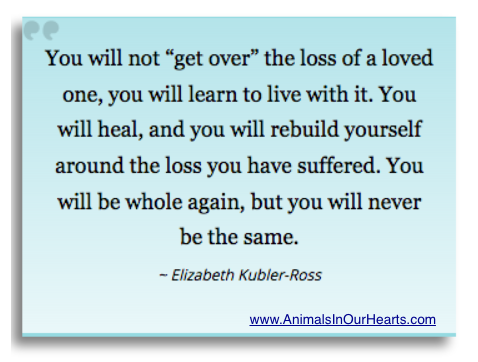
Flower Essences to Help Us Cope and Heal From Grief
I believe that the most effective, satisfactory and long lasting approach to healing grief is an integrative one—one that explores and may include traditional psychological support as well as embracing spiritual and other holistic modalities. Each journey of grief is different, each grievers' needs unique, and the resources most suited to help each of us varies.
I think it's also important to remember that however thorough and integrative our healing efforts, no flower essence, spiritual belief system or the most loving support in the world can take away the emotional pain of grief when our animal or human loved ones die. Loss and its subsequent pain are natural, inevitable experiences of life. Pain, however, does not have to include the quality of suffering. Suffering isn't necessary. Pain can be surrounded instead with the quality of quiet grace, allowing us the energy to embrace the rich opportunities loss offers us to learn, grow and transform. Flower essences help remove the element of suffering surrounding our painful grief and invite in the qualities of grace, learning and transformation. Unlike drugs, flower essences don't mask or suppress pain or other symptoms. They gently yet powerfully help us heal our pain, inviting in the grace and courage we need to do so. May the essences bring you comfort and peace in your time of grief.
For more information on how to use flower essences please visit the section: Flower Essences for Animals & People and explore the class Flower Essences for Illness, End-of-Life, Caregiver Stress and Healing Grief.

The Grief Relief Formula by FES is a highly recommended formula of flower essences to bring comfort, relief and healing during times of loss.
I have been studying, using and recommending FES flower essences since 1989. I was particularly pleased when they developed this grief formula because the essences included are gently and powerfully helpful to our healing no matter what our loss, no matter what our individual responses to our loss, no matter what "phase" of our healing we may be in on a given day or moment. This formula will help you, or your grieving animal, experience both relief from what can be the staggering pain of grief on any day, as well as help you heal gently from deep within. It includes the flower essences Bleeding Heart, Pink Yarrow, California Wild Rose, Love Lies Bleeding, Borage, Forget-Me-Not, and Explorer's Gentian.
For those of you who prefer to choose individual essences that will serve your healing process rather than a pre-mixed formula, the list below will help you discern what will best help you.
All of the essences below are from FES. For more comprehensive descriptions of these essences, and for a lifelong reference book about essences developed for our emotional and spiritual support by both Dr. Bach and FES, you may want to read the Flower Essence Repertory.
-
Bleeding Heart helps us fully feel the spiritual connection of love we will always have with loved ones, even after death. It helps us accept the change in form of a relationship, to let go of and release our attachment to the physical form of our animal loved one.
-
Borage helps us overcome feelings of depression and heavy-heartedness from the death or impending death of a loved one. Borage gives us courage to face our grief, a sense of upliftment and buoyant hope to help us not get stuck in the weight of depression.
-
Forget-Me-Not deepens our awareness of our spiritual connection with those who have physically died and helps us develop telepathic communication with them.
-
Love Lies Bleeding helps us with profound feelings of melancholia and anguish, especially when the soul suffers privately and is cut off from others. It also helps us find transpersonal meaning from pain and suffering.
-
California Wild Rose helps us when our loss is so overwhelming that we may have thoughts of suicide. One of the most beautiful and fundamental of flower remedies, it helps the soul to fully incarnate and really take hold of and accept the challenges of life on Earth, and connect again to enthusiasm for earthly life, stimulating the love forces of the heart for others and for self.
-
Madia and Honeysuckle can help us when we are having trouble getting back to functioning in our daily lives while grieving. Madia helps with focus and concentration (i.e. driving a car, carrying out work, home or family responsibilities), while honeysuckle helps us live in the here-and-now, helping us go on after death or loss.
-
Mariposa Lily: Sometimes grief makes us feel cut off from love--our ability to ever love or be loved again in the way we have with the one who has died. Sometimes, too, we get stuck in our grief because we don't believe in our ability to love ourselves in the way our animal loved us. Mariposa Lily helps open our hearts to love, from the spirit of our animal, from others beings, and from ourselves.
-
Star of Bethlehem, one of the essences in Five Flower Formula, is a deeply restorative remedy, bringing calm, soothing, healing qualities, comfort and reassurance from the spiritual world. Can be especially helpful when we feel in shock, or greatly overwhelmed. Brand: Bach and FES.
When We Feel Guilty:
-
White Chestnut is helpful in releasing anxious, repetitive thoughts such as "Oh my God, why didn't I. . .", or "If only I had done such and such."
-
Pine helps us move from being stuck in self-blame, remorse or shame to a state of self-forgiveness and self- acceptance.
For Those Who Work With Rescue and Shelter Animals:
-
Red Chestnut is very helpful when we feel obsessive fear or worry that we have not done enough, that it's our job to save our animal and if we don't we've failed. It is also particularly helpful with rescue workers, or foster guardians, who feel they must "save them all" and feel guilty when they can't. Red Chestnut helps us let go of an over-exaggerated sense of obligation, or a drive to help others at the cost of ourselves. It helps us know when we've "done enough"--for that day, or for that animal. It helps us remember that it is OK for us to have a life for ourselves, beyond giving to animals or others. Red Chestnut deepens and restores our trust in a Divine source of support for the animals we love, helping us remember we are not the only source of their support.
When We Are Having Trouble Accepting Death and Tragedy:
-
Sagebrush helps us accept pain and emptiness of any kind of loss.
-
Wild Rose helps us accept the tragic events of life especially when we feel a resigned, lack of hope.
-
Chrysanthemum helps us accept the transitory nature of earthly life and helps us heal any fears and avoidance of physical death.
When We Are Having Difficulty Expressing Or Releasing Our Feelings:
-
Dandelion helps us release feelings of grief or pain that are stuck in the body, often helpful when we know our emotions are making us feel tense in the body.
-
Fuchsia helps us contact grief which may be repressed, perhaps when we long to express our feelings but are afraid of being overwhelmed by them.
-
Golden Ear Drops helps us release tears of grief that may be held back. Can be especially helpful when our current loss is bringing up pain from past losses.
-
Yerba Santa helps us build our capacity to express a full range of emotion, especially when pain has been internalized or constricted in the heart and chest area.
When We Are Feeling Like We Don't Belong Here Without Our Animal, When We Perhaps Feel Alienated in a World or Culture Which Doesn't Understand, Accept or Acknowledge the Deep Love We Have for our Animals, When We Feel Like We May Not Fit Here, or Have a Place:
-
Shooting Star helps us heal a profound feeling of alienation, especially not feeling at home on earth, nor a part of the human family. It can be especially helpful when we feel more a part of the animal kingdom than part of humanity.
-
Sweet Pea: Whether primarily with humans or animals, we all need to feel we "belong" in a community, a family or place. This essence strengthens our deepest knowing that we each have a unique place of belonging on the earth and with other beings. It eases the sense of "homelessness" or "familyless-ness" often felt when a deeply beloved animal dies.
Why We Deserve Nurturing and Self-Care
Grief is indifferent to the species lost™
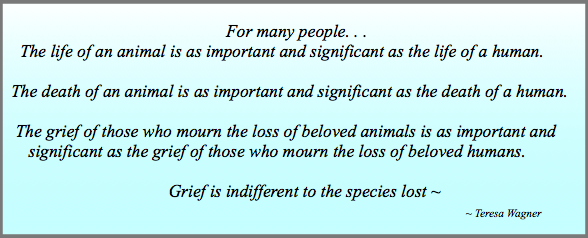
As a person who loves and has lost a cherished animal, you deserve understanding and comfort in your time of pain. You deserve to feel acknowledged and honored as a person who is grieving a significant life loss. You deserve to feel absolutely, positively normal in loving animals as deeply as you do. You deserve to know that there is nothing wrong with you if you love animals as much or more than people. You have given your heart deeply and completely to another being who is now physically gone from your life. You have a right to mourn. You need to mourn and you deserve support and acceptance as you do.
Your heart may be in great pain now, in pain as deeply as you have loved. Experiencing a major loss creates a wound, an emotional wound that needs conscious attention to heal as much as a physical wound needs attention to heal. An abundance of tools are available to help you cope and heal. Support groups, counseling, books, guided meditations, classes and flower essences are just some of the resources available to help with healing our grief, to find meaning in our loss and to embrace the legacies left to us. Reach out for support. Take care of yourself as lovingly as you did your beloved animal. You may find help that is just right for you at the Library of Resources for Pet Loss.
There are people, animals and divine sources waiting to support and nourish you. Keep your heart and mind open to all who are available to help you heal. You may feel very much alone. In a way, you are, because no one has ever loved and lost the animal you love and have lost. Every animal, every loving relationship with an animal, and every loss is unique. But you are not completely alone. We are all here together, those of us who love animals, to love and help one another. Let yourself be loved and supported by others who understand and have experienced similar losses, even if not in an identical situation to yours. The depth of your love for your animal is a reflection of your capacity to love greatly. Let that ability to love extend to yourself now. Let that love--from your animal, from yourself, from other humans and animals who love you and from the spiritual sources of your belief system--fill your heart and give you strength during your time of pain and healing. Even as you cry, let yourself feel the love inside you and around you. Your capacity to love and be loved did not die with your animal. It is your animal's body that has died, not the love. All the love is still there. Along with the sadness, the anguish and doubts that you may ever feel joy again, the love is there. The love you and your animal share is bigger than any pain. It is as big as all the oceans of the earth. Love never dies. Let yourself feel it, right next to your pain. And always, be gentle, patient and loving with yourself as you heal.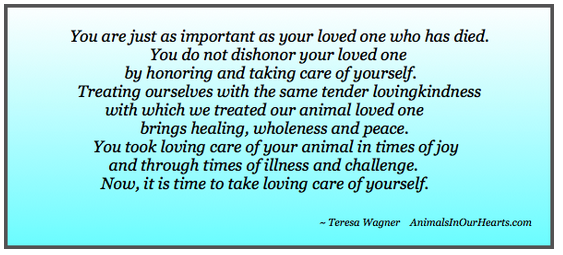
For in-depth support, consider taking this on demand class filled with resources that can lovingly guide and support you both immediately and at any time in the future:

